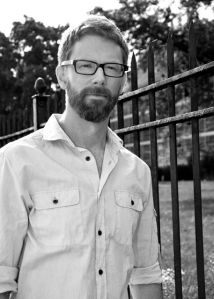Our “How I Write” series asks writers from the University of Louisville community and beyond to respond to five questions that provide insight into their writing processes and offer advice to other writers. Through this series, we promote the idea that learning to write is an ongoing, life-long process and that all writers, from first-year students to career professionals, benefit from discussing and collaborating on their work with thoughtful and respectful readers. The series will be featured every other Wednesday.
Austin Bunn’s writing has appeared in The Atlantic, The New York Times Magazine, The Best American Science and Nature Writing, The Pushcart Prize anthology, and elsewhere. His collection of short stories, The Brink, is forthcoming from Harper Perennial (2015). He wrote the screenplay to the film Kill Your Darlings (Sony Pictures Classics), with the film’s director John Krokidas, about the origins of the Beat generation writers, staring Daniel Radcliffe, Dane DeHaan, and Michael C. Hall. The film premiered at Sundance 2013, and screened at the Venice, Toronto, London, and Hampton’s Film Festivals. He teaches at Cornell University.
How I Write: Austin Bunn
Location: Ithaca, NY
Current project: Original screenplay, short documentary, devised play, and more fiction!
Currently reading: The Trip to Echo Spring by Olivia Laing and The Song Is You by Arthur Phillips.
- What type(s) of writing do you regularly engage in?
These days, I find myself drawn to writing screenplays — I love the collaborative experience of making film, the most powerful art form of our time. Also, frankly, screenwriting is, for me, much much easier to produce than fiction. Great fiction demands close attention to the filigree of sentences, original perceptions rendered in fresh language, and consciousness on the page. When done well, there’s nothing like it, and the satisfaction of moving a reader through prose is a deep reward. But man, it’s work!
- When/where/how do you write?
I have an office, with a good desk, nice classic chair, and a view of my front lawn. And I never use it. I end up going to a coffeeshop and parking myself for hours there – it keeps the distractions (email, phone calls, news) at bay. I tend to write for about 3-4 hours and then I’m done and I need other people.

- What are your writing necessities—tools, accessories, music, spaces?
Foremost: music. If I forget my headphones when I head to the coffeeshop, I know I’m in for a difficult morning. When I start a new project, I start by shopping for a soundtrack: something to inspire, provoke, contextualize what I’m doing. For Kill Your Darlings, it included bebop jazz, period love songs (“You Only Hurt the One You Love”), and a lot of Sigor Ros and Jonsi. Then we were lucky enough to get all of them on the soundtrack!
- What is your best tip for getting started and/or for revision?
Getting started has never been hard for me. The blank page is my friend, and I think you need to make friends with it. I give myself total permission to write poorly but I try to find the “voice” of the piece: is it edgy and dense? Funny? Searching and quiet? Those first days are exploratory. Revision is another matter entirely: I don’t love it. It requires the part of my brain that is a close-reader, that inches the bar higher and higher, that expects more from me than I thought I had. I also feel like I can revise sentences forever. Sam Lipsyte told me that if you find yourself revising a sentence once and then revising it BACK to the way you had it, you’re done. Move on.
- What is the best writing advice you’ve received?
“Deeply imagine.” Ethan Canin.
“There is no good part. It should all be the good part.” Sam Lipsyte.
“Writing is about the inner experience of life; that is what writing can do that no other art form can.” Marilyn Robinson.
“All actual life is encounter.” Martin Buber.
“You are allowed shitty first drafts.” Anne Lamott
